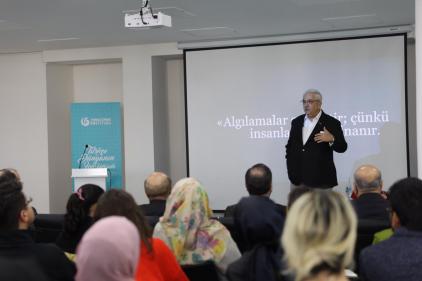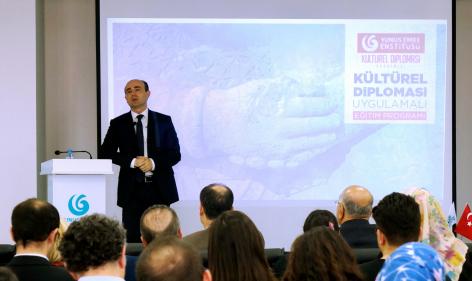"Turkish cuisine is one of the most powerful tools of cultural diplomacy."
Communication Expert Ali Saydam and Ministry of Foreign Affairs Diplomacy Academy President Prof. Dr. Mesut Özcan have delivered lectures as part of the "Applied Cultural Diplomacy Training Program," organized by Yunus Emre Institute's Cultural Diplomacy Academy.
In his speech, Saydam stated that gastrodiplomacy activities have been integrated into diplomacy activities of many countries around the world, especially since 2000s. He explained that many countries see culinary culture as a key tool for diplomacy and have started to invest millions of dollars in this area.
Drawing attention to the rich content of the Turkish cuisine and its potential for emerging as a world-class brand, Saydam stressed that this richness should be transferred using appropriate strategies.
"Communities and individuals gain upper hand in diplomacy"
Ministry of Foreign Affairs Diplomacy Academy President Prof. Dr. Mesut Özcan pointed out that cultural diplomacy proves to be one of the most important areas of diplomacy in the globalizing world.
Prof. Özcan noted that in the 21st century, diplomacy comprises not only mutual relationships between statesmen, but also the relations between communities and individuals. "As communities and individuals are given greater room in diplomacy, cultures become more important in the relations. As the concept of culture has increasingly made into diplomacy, the institutions like Yunus Emre Institute, Maarif Foundation of Turkey and the Turkish Cooperation and Coordination Agency (TİKA) have become more important. These institutions ensure that diplomacy is reinforced in the field of culture," he said.
Yunus Emre Institute Cultural Diplomacy Academy
As part of the "Applied Cultural Diplomacy Training Program" organized by Yunus Emre Institute's Cultural Diplomacy Academy, the participants have an opportunity to examine Turkey's current status in cultural diplomacy, its great potential in this area and its perspective that differs from other global actors from a comparative perspective.
They will learn basic concepts and contemporary practices under the mentoring of the most competent scholars in the fields of public diplomacy, cultural diplomacy and international relations during the program, enriched with seminars, talks, panel discussions, workshops, interactive evaluations, film screenings, cultural and artistic events, and scenario-based simulations.




